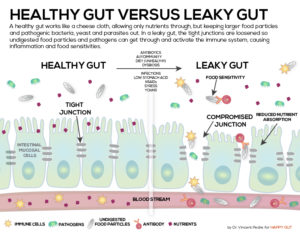Probiotics–Does Your Cat Need Them?

Photo credit: Ollie the Tonk, Instagram
Probiotics are no longer just another buzz-word. Like omega 3s were years ago, their popularity continues to rise as we learn more about what makes them so beneficial. These tiny microbes are proving to be the missing nutrients necessary for optimal health in both humans and pets. Consequently, most veterinarians are now embracing their use as they discover exactly how they impact the microbiome. Knowing all this, should your cat be taking them?
Probiotics–The Missing Nutrients
I took a great webinar this week from Dr. Doug Knueven, DVM, about probiotics. Before this I knew that probiotics were beneficial, but I had no idea how they play specific roles in healing and prevention. He shared some great information that I couldn’t wait to pass along. Now that more and more studies are being done on probiotics, scientists are learning how they have a direct impact on our health. For example, did you know that they play a role in
- Ridding the body of pathogens
- Healing leaky gut, inflammation and auto-immune diseases
- Altering behavior by way of the gut-brain
- Metabolism and obesity
- Detoxing the body by supporting the liver
What Are Probiotics?
Probiotic means “for life.” Probiotics are tiny microorganisms that promote life-giving benefits to the host they reside in. This is true for both humans and animals. In animals the most common probiotic microorganisms are species belonging to “Bacillus, Enterococcus, Lactobacillus, Aspergillus and Saccharomyces.”²
Because probiotics cannot be made by the body itself they must be obtained through what is eaten. Animals in the wild obtains these microorganisms when they eat the organs, stomach contents and intestines of their prey. They’re also consumed when eating dead carcasses.
In order to survive, every organism needs food, and probiotics are no different. Prebiotics are the food source for these microorganisms. They’re found as short- and long-chain oligosaccharides (inulin), a type of sugar. Not surprisingly, many pet food manufacturers are adding sources of prebiotics and probiotics to food to help support better gut health.
The Microbiome-Probiotic Relationship
What exactly is the microbiome? “The intestinal microbiota is the collection of the living microorganisms (bacteria, fungi, protozoa, and viruses) inhabiting the gastrointestinal tract.” ¹ Russian-born biologist Elie Metchnikoff discovered the importance of the microbiome and became known as the Father of Natural Immunity. As a result we now know that the “good” bacteria has to outnumber the “bad” when it comes to optimal health.
The microbiome plays many roles, including:
- Breaking down foods further to liberate more nutrients
- Manufacturing several vitamins, including B and K
- Inhibiting disease causing bacteria
- Maintaining the integrity of the intestinal wall lining
- Protecting against bodily inflammation and leaky gut syndrome
- Affecting the systemic immune system
- Affecting brain chemistry and structure
- Helping the body to detox, putting less stress on the liver
Did you know the microbiome had so many functions? For these reasons probiotics have an important job to do!

Photo credit: Happy Gut
Leaky Gut Syndrome
So how exactly does the gut/microbiome become compromised? The intestinal wall lining is the defensive shield that keeps out things that shouldn’t pass into the blood stream. When the lining loses its integrity gaps will develop. As a result these gaps allow substances like food particles, bacteria, viruses, etc, to pass through and enter the bloodstream. White blood cells take notice that something “foreign” has entered their environment and launch an attack. Hence, there is an immune response. This is how people and pets develop auto-immune diseases, allergies, and more.
Probiotics To The Rescue!
Studies have demonstrated that probiotics decrease intestinal permeability. When the intestinal lining integrity is restored the gut can heal, and this has a positive effect on the overall body. Dr. Knueven presented the results probiotics had in several studies :
- The immune system and overall immune function is stronger
- Probiotics aid in the prevention and treatment of allergies
- Impacts the development of Diabetes Mellitus
- Gut microbiome affects the brain and depressive disorders and anxiety
- Microbiome affects metabolism/obesity
- Probiotics have been found to reduce pancreatic sepsis in cases of acute pancreatitis
- Specific probiotics have demonstrated to help protect against UTIs and bladder cancer
Selecting The Right Probiotic For Your Cat
When selecting a probiotic for your cat here are a few things to keep in mind. First of all, choose one with as many strains as possible. Studies have shown that multi-strain probiotics are more effective than single strains.
Secondly, look for the NASC Quality Seal. The National Animal Supplement Council is a non-profit industry trade association and animal advocacy group. These members are subject to ongoing monitoring and quality review. Sadly, there are very few products that actually have proper labels and meet those claims.
Lastly, once you’ve selected a multi-strain product with the NASC quality seal, the next step is to muscle test it. Without a doubt your cat’s body knows exactly what will work and what won’t work, and muscle testing is truly the best way to find out.
Have you used a probiotic for your cat? Share in the comments below!

